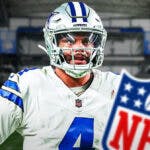The Dallas Cowboys, known colloquially as America's Team, are one of the most popular professional sports franchises in the world. So, of course, they've boasted some of football's all-time greats. The team has also made some of the NFL's most impactful trades.
Here are the five best deals in Cowboys history.
5. Amari Cooper (2018)
The fourth overall pick in 2015, Cooper was a good player for the Oakland Raiders, but never quite lived up to expectations, with drop issues plaguing him over three-and-a-half seasons. As a Raider, he caught 225 passes for 3,183 yards and 19 touchdowns with 35 drops in 52 games.
Midway through the 2018 campaign, the Cowboys sent a first-round pick (which ended up being 27th overall) to the Raiders for Cooper. This was thought to be an overpay, as Cooper was not expected to fetch much more than third-rounder. But the team knew what they were doing, and through 25 games with Dallas, Cooper has hauled in 132 passes for 1,914 yards and 14 scores with just 11 drops.
Cooper's catch rate has jumped from 57.8 percent with the Raiders to 67.7 percent with the Cowboys, his TD rate from 8.4 to 10.6 percent, and his drop rate has fallen from 15.6 to 8.3 percent. One of the league's premier route runners, Cooper was rewarded with a five-year, $100 million contract extension, keeping Dak Prescott's No. 1 target in Dallas long-term. Two years ago it would have been ridiculous to suggest a team giving up a first-round pick for Cooper and then making him the richest wide receiver in NFL history. But sometimes a change of scenery is all a player needs, and Cooper is now living up this draft billing.
4. Ed “Too Tall” Jones and Danny White (1974)
For the second year in a row, the Houston Oilers held the first overall pick. After taking John Matuszak in 1973, Houston traded the pick, along with a third-rounder, to the Cowboys for defensive end Tody Smith and receiver Billy Parks.
Neither player did much for the Oilers, but the Cowboys made out like bandits. They first chose DE Ed “Too Tall” Jones out of Tennessee State, who spent a total of 15 seasons in Dallas, with a one-year break in 1979 as Jones attempted a professional boxing career. He officially logged 57.5 sacks, as sacks were not tracked as a statistic until 1982, but the Cowboys credit Jones with a total of 106. He is a folk legend because of his massive 6-9, 271-pound frame, but he was an excellent player as well, making three Pro Bowls, one All-Pro team, and winning one Super Bowl.
With their third-rounder, Dallas selected Arizona State quarterback Danny White, although they wanted him to play punter, so he signed with the Memphis Southmen of the World Football League instead. After two seasons, he joined the Cowboys, and took over for Hall of Fame signal-caller Roger Staubach in 1980, a position he held until 1988. As a starter, White went 62-30, throwing for 21,959 yards, 155 touchdowns, and 132 interceptions. He made the Pro Bowl in 1982, and led the team to five playoff victories. Pretty good for a third-round punter.
3. Charles Haley (1993)
Dallas was good before Haley showed up, but this trade took the Cowboys to the next level. Haley had collected 63.5 sacks in six seasons with the San Francisco 49ers, making the All-Pro team in 1990. He clashed with coaches and teammates, leading to the Niners moving him to Dallas in exchange for a 1993 second-round pick and a 1994 third-rounder.
The Cowboys ended up winning three of the next four Super Bowls, with Haley as a centerpiece on defense. In 63 games over five seasons, Haley totaled 34 sacks, and was named an All-Pro in 1994.
He dealt with multiple injuries during his time in Dallas but was still dominant. He retired following the conclusion of the 1994 season, but the Cowboys convinced him to return with a new contract. He actually retired after the 1996 campaign, but returned to the league in 1997 with the 49ers, and spent two years as a backup for his original team. Haley hung up his cleats for good after 1999, and was finally inducted into the Pro Football Hall of Fame in 2015—an honor long overdue.
2. Emmitt Smith (1990)
With the 21st overall pick in 1990, the Cowboys were targeting Baylor linebacker James Francis, but he went 12th overall to the Cincinnati Bengals. Their second choice was Florida running back Emmitt Smith, and, not wanting to have their guy sniped a second time, sent a third-round pick to the Pittsburgh Steelers to move up to No. 17 to secure Smith.
That ended up being a pretty good decision, as Smith played 13 seasons in Dallas, and is the NFL's all-time rushing leader, a mark that is highly unlikely to ever be broken. His first and last seasons with the Cowboys were the only two where he did not top 1,000 rushing yards, and got within 63 yards each time.
Smith retired having carried the ball 4,409 times for 18,355 yards and 164 touchdowns. Smith was also a threat in the passing game, catching 515 passes for 3,224 yards and 11 scores. His leadership was invaluable in the locker room, especially during his later years when the Cowboys weren't nearly as good as they were when Smith was younger. He is an all-time great, and Dallas did well in moving up for him.
1. Herschel Walker (1989)
Hands down the most lopsided trade in NFL history, Walker had an almost mythical amount of fanfare coming out of Georgia, and spent three years in the USFL before joining the Cowboys in 1985. He had an excellent 1988 campaign, rushing for 1,514 yards, but was just alright for Dallas other than that.
In 1989, the Minnesota Vikings decided that they could get the most out of Walker, and concocted a three-team mega-deal. The Cowboys ended up receiving multiple draft picks, linebackers Jesse Solomon and David Howard, cornerback Issiac Holt, and defensive end Alex Stewart for Walker and picks.
This trade laid the foundation for the Cowboys' three Super Bowl victories throughout the 1990's, allowing the team to draft players like Emmitt Smith and Rod Woodson, among others. Meanwhile, Walker would be with a new team by 1992, leaving the Vikings with almost nothing to show for their gigantic transaction.




